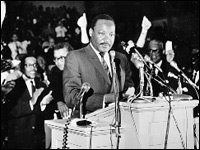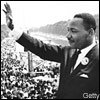



I was five-years-old when Rosa Parks and Dr. King began their heroic quest to break the back of the Jim Crow South of which I was a part. I grew up watching with amazement the unfolding liberation events we refer to as the American Civil Rights Movement.
I remember exactly what I was doing on April 4, 1968 when the news came that Dr. King had been gunned down in Memphis, Tennessee. I often wonder what America would be like today had he not been murdered.
If he were alive, we would have celebrated his 77th birthday yesterday.
Remembering Dr. King, his work and his legacy in view of life in the urban centers of our nation today forces me to conclude that we need a new and continuing movement for liberation and justice.
So, on the national holiday set aside to honor Dr. King, I am wondering, what would he be doing if he were still alive and with us in today's America?
Actually, I think I know.
If Dr. King was working today, he would. . .
. . .speak out on behalf of working people in America. When he died, Dr. King was in Memphis supporting the strike of Memphis sanitation workers. He would be calling for justice in pay and wages for working Americans who almost forty years later find themselves in an even weaker position than in 1968. His concern would include full funding for training resources to assist American workers in enhancing their skills so that they could earn more for their work.
. . .call our leaders to find a solution to our national health and wellness crisis. At the center of his argument would be a call for fairness and justice in the arena of health care delivery and outcomes. He would be speak forcefully to the glaring and undeniable disparities, cutting along racial lines, that are a national shame.
. . .challenge us to provide decent, affordable housing for every individual and family in America. He would call us to account about the growing problem of homelessness. He would insist that working families deserve fit, affordable places in which to live and raise their families.
. . .question the current rhetoric about our national commitment to high-quality public education. Dr. King would be concerned about our return to segregation in the public schools and he would insist on providing what our schools need to prepare our children for life in our changing, shrinking, high-tech world. He would not allow us to leave any child behind.
. . .rebuke our leaders for their support of the current tax cuts for the wealthy at the expense of programs designed to lift the poor. He would clearly, truthfully contextualize the so-called gains in employment and job creation, pointing out the fact that the jobs created over the past 5 years have been lower paying than the jobs lost. He would let us know that earnings for American working families have declined annually since 2000, while our wealthiest citizens have enjoyed amazing income growth.
. . .offer alternative solutions and responses other than incarceration for dealing with non-violent drug offenders who are found disproportionately among the urban poor. He would challenge the "prison industry" that costs our states billions with terrible and counter-productive outcomes, especially for inner city neighborhoods. He would remind us that treatment is what is needed, not imprisonment for the poor.
. . .insist that the nation take a long, hard look at our foreign policy and how our actions abroad affect our people here at home. At the top of his list would be the current war in Iraq.
. . .remind us of the values of the faiths we confess and of just how those values relate to growing American poverty. Dr. King was a prophet. He would point us to the Hebrew prophets and to Jesus in an effort to re-tool our national conscience. In the process he would issue a clear, unrelenting call to the churches, the synagogues, the temples and the mosques of America to stand up, speak out and become involved in shaping a fairer, more just response to the problems of the urban poor.
. . .provoke a much more honest, better informed, less partisan national debate about public policy, justice, poverty, economic development and freedom in the United States.
. . .model love for all people.
How I wish he was still alive.
But, he is not.
We who celebrate his life and work must continue to follow his example and his call. We must complete what he and many others began.
10 comments:
If Dr. King were alive today, he'd be very proud of you, Larry! And I bet he'd be a donor to your ministry - keep up the good work!
IBreakCellPhones, thanks for the post.
Yes, I do think he would be critical of some aspects of the current "movement." As a matter of fact, he was when he was alive. Even toward the end of his life he criticized those who were in the struggle for the sake of self-promotion. He also was critical of those who were fearful of extending the movement morally to include concerns related to poverty in general and to peace as it related to the war. And, of course, he was consistently critical of those who advocated and employed violence to promote their issues and causes.
King was noted for being self-critical both personally and of the movement itself.
What do you think?
Great post. I had the privilege of taking my 4 year old daughter today to our local museum at Baylor University and show her an exhibit on the life of Dr. King. When we were done she wanted me to go back and tell her about Rosa Parks and the Montgomery Bus Boycott again. I was more than happy to.
If Dr. King were alive today, I believe that black America would be very different. Many of the problems that you mentioned may not be problems because Dr. King emphasis was not "the color of our skin, but the content of our character." Who is to say that Dr. King would not have been president?
I believe that Dr. King would be closer to the philosphical views of John Mcwhorter rather than Cornell West.
IBreakCellPhones, thanks for continuing the conversation.
Dr. King ascribed to the teachings of Ghandi. He was devoted to non-violence as a lifestyle and as a patriot.
I don't think anyone is talking about "peace at any price." What Dr. King says to me is that diplomacy and back channels are sometimes very, very effective. He pulled that off again and again during the movement with very violent Southerners and their leaders.
He challenged LBJ about Viet Nam and he was correct. He would have things to say today as well. We could use his wisdom.
As to the "invisible foot" of government, it seems to be working fairly well these days for the top 5% and it doesn't even seem to be all that invisible!
Oh, I disagree, IBreakCellPhones. If you read the history of the exile carefully and of various segments of Israel/Judah's history, you will find that the people's refusal to abide by these dictates for the sake of justice is one of the main reasons behind the captivity.
Wow. I'm amazed at how readily you eploit someone's legacy.
Anonymous, I don't think Larry is exploiting Dr. King's legacy. Remember, he died in Memphis taking part in a work action for the poor--a labor strike. How do you think he exploits King's legacy?
As we work everyday for a local human rights law to protect the poor and homeless on the streets of Kalamazoo, we know that we are standing on the shoulders of Dr. King. He told an uncaring world that all of God's children deserve justice and dignity in the Kingdom on earth. We have lived in the presence of a prophet of God - an awe inpiring thought!
Post a Comment